An editor has nominated this article for deletion. You are welcome to participate in the deletion discussion , which will decide whether or not to retain it. |
| Founder | William Thomas and Thomas Grose |
|---|---|
| Headquarters | , |
| Parent | Arlington Printing And Playing Card Company, L.L.C. doing business as Gambler's Warehouse |
| Website | libertycards |
Liberty Playing Card Company is a Texas-based company which produces custom-made playing cards.
Liberty was started in 1970 in Chicago. In the late-1970s, it moved down to Arlington, Texas. In the late 1980s, all of the playing card assets of Western Playing Card Co. (Western Publishing) brands such as Guild, Colortone, Invincible, Imperial, Boulevard, Western, Whitman etc. were acquired. In 2003, they produced the most-wanted Iraqi playing cards for the United States government. [1] They also made a set of cards parodying the most wanted Iraqi cards, which featured US government officials.
At present, the Liberty Playing Card Company is a subsidiary of Arlington Printing and Playing Card Company, L.L.C. doing business as Gambler's Warehouse, located at 202 N Great SouthWest Parkway, Grand Prairie, Texas. Liberty manufacturers playing cards, trading cards and games and poker chips, with a focus on specialty advertising decks for businesses. Gambler's Warehouse is a major online retailer of playing cards and related casino supplies, such as security boxes, chip trays, table layouts, roulette wheels, and craps equipment.

A debit card, also known as a check card or bank card, is a payment card that can be used in place of cash to make purchases. The card usually consists of the bank's name, a card number, the cardholder's name, and an expiration date, on either the front or the back. Many new cards now have a chip on them, which allows people to use their card by touch (contactless), or by inserting the card and keying in a PIN as with swiping the magnetic stripe. Debit cards are similar to a credit card, but the money for the purchase must be in the cardholder's bank account at the time of the purchase and is immediately transferred directly from that account to the merchant's account to pay for the purchase.
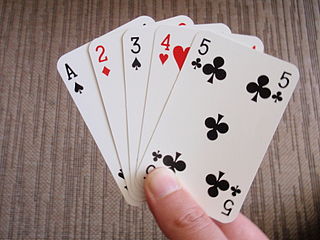
A playing card is a piece of specially prepared card stock, heavy paper, thin cardboard, plastic-coated paper, cotton-paper blend, or thin plastic that is marked with distinguishing motifs. Often the front (face) and back of each card has a finish to make handling easier. They are most commonly used for playing card games, and are also used in magic tricks, cardistry, card throwing, and card houses; cards may also be collected. Playing cards are typically palm-sized for convenient handling, and usually are sold together in a set as a deck of cards or pack of cards.

Texas hold 'em is one of the most popular variants of the card game of poker. Two cards, known as hole cards, are dealt face down to each player, and then five community cards are dealt face up in three stages. The stages consist of a series of three cards, later an additional single card, and a final card. Each player seeks the best five-card poker hand from any combination of the seven cards: the five community cards and their two hole cards. Players have betting options to check, call, raise, or fold. Rounds of betting take place before the flop is dealt and after each subsequent deal. The player who has the best hand and has not folded by the end of all betting rounds wins all of the money bet for the hand, known as the pot. In certain situations, a "split pot" or "tie" can occur when two players have hands of equivalent value. This is also called "chop the pot". Texas hold 'em is also the H game featured in HORSE and HOSE.

During the 2003 invasion of Iraq by a United States–led coalition, the U.S. Defense Intelligence Agency developed a set of playing cards to help troops identify the most-wanted members of President Saddam Hussein's government, mostly high-ranking members of the Iraqi Regional Branch of the Arab Socialist Ba'ath Party or members of the Revolutionary Command Council; among them were some of Hussein's family members. The cards were officially named the "personality identification playing cards". As of 2021, all but four of the 52 most wanted have either died or been captured, eleven of whom have been released.

The United States Playing Card Company is a large American producer and distributor of playing cards. It was established in 1867 as Russell, Morgan & Co. and founded in Cincinnati, Ohio in its current incarnation in 1885. Its many brands include Bicycle, Bee, Tally-Ho, Champion, Congress, Aviator, Aristocrat, Mohawk, Maverick, KEM, Hoyle and Fournier. It also produces novelty and custom playing cards, and other playing card accessories such as poker chips. For decades the company was based in Norwood, Ohio, but as of 2009, the USPC is currently headquartered in the Cincinnati suburb of Erlanger, Kentucky.

The Topps Company, Inc. is an American company that manufactures trading cards and other collectibles. Formerly based in New York City, Topps is best known as a leading producer of baseball and other sports and non-sports themed trading cards. Topps also produces cards under the brand names Allen & Ginter and Bowman.
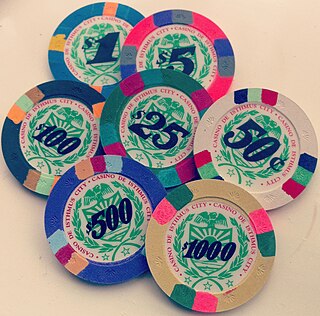
Casino chips are small discs used as currency in casinos. Larger, rectangular gaming plaques may be used for high-stakes games. Poker chips are also widely used as play money in casual or tournament games, are of numismatic value to casino chip collectors, or may be kept as souvenirs.

Bank One Corporation was an American bank founded in 1968 and at its peak the sixth-largest bank in the United States. It traded on the New York Stock Exchange under the stock symbol ONE. The company merged with JPMorgan Chase & Co. on July 1, 2004, with its CEO Jamie Dimon taking the lead at the combined company. The company had its headquarters in the Bank One Plaza in the Chicago Loop in Chicago, Illinois, now the headquarters of Chase's retail banking division.

Gambling in Macau has been legal since the 1850s when the Portuguese government legalised the activity in the autonomous colony. Since then, Macau has become known worldwide as the "Gambling capital of the world". It is the only place in China where casino gambling is legal.
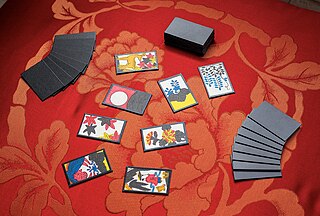
Hanafuda are a type of Japanese playing cards. They are typically smaller than Western playing cards, only 5.4 by 3.2 cm, but thicker and stiffer, and often with a pronounced curve. On the face of each card is a depiction of plants, tanzaku (短冊), animals, birds, or man-made objects. One single card depicts a human. The back side is usually plain, without a pattern or design of any kind, and traditionally colored either red or black. Hanafuda are used to play a variety of games including Koi-Koi and Hachi-Hachi.

The ace of spades is traditionally the highest and most valued card in the deck of playing cards. The actual value of the card varies from game to game.

A time clock, sometimes known as a clock card machine, punch clock, or time recorder, is a device that records start and end times for hourly employees at a place of business.

John Scarne was an American magician and author who was particularly adept at playing card manipulation. He became known as an expert on cards and other games, and authored a number of popular books on cards, gambling, and related topics.
Cheating in casinos refers to actions by the player or the house which are prohibited by regional gambling control authorities. This may involve using suspect apparatus, interfering with apparatus, chip fraud or misrepresenting games. The formally prescribed sanctions for cheating depend on the circumstances and gravity of the cheating and the jurisdiction in which the casino operates. In Nevada, for a player to cheat in a casino is a felony under Nevada law. In most other jurisdictions, specific statutes do not exist, and alleged instances of cheating are resolved by the gambling authority who may have more or less authority to enforce its verdict.
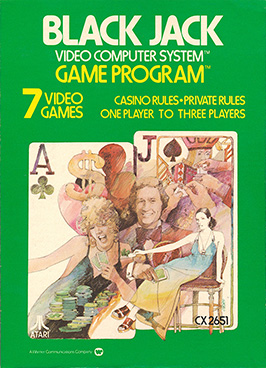
Blackjack is a video game simulation of the card game blackjack. It was designed by Bob Whitehead for the Atari Video Computer System. The game allows up to three players to play a variation of blackjack. Each player is given 200 chips where they can bet 1 to 25 of each round. The game ends for a player when they either run out of chips or earns 1000 chips or more.
The following is a glossary of poker terms used in the card game of poker. It supplements the glossary of card game terms. Besides the terms listed here, there are thousands of common and uncommon poker slang terms. This is not intended to be a formal dictionary; precise usage details and multiple closely related senses are omitted here in favor of concise treatment of the basics.

The history of vice in the U.S. state of Texas has been an important part of the state's past and has greatly influenced its development. Vice activities, such as gambling and prostitution, have historically been a significant facet of both the state's culture and its economy.
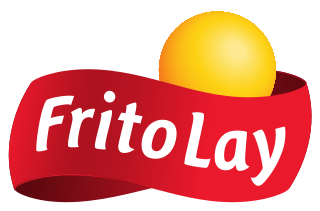
Frito-Lay, Inc. is an American subsidiary of PepsiCo that manufactures, markets, and sells corn chips, potato chips, and other snack foods. The primary snack food brands produced under the Frito-Lay name include Fritos corn chips, Cheetos cheese-flavored snacks, Doritos and Tostitos tortilla chips, Lay's and Ruffles potato chips, Rold Gold pretzels, and Walkers potato crisps. Each brand generated annual worldwide sales over $1 billion in 2009.
The card game of poker was developed in the United States at some point during the early 19th century, drawing its name and basic concept from much earlier European games. Since its early beginnings, poker has grown to become an extremely popular pastime throughout the world.